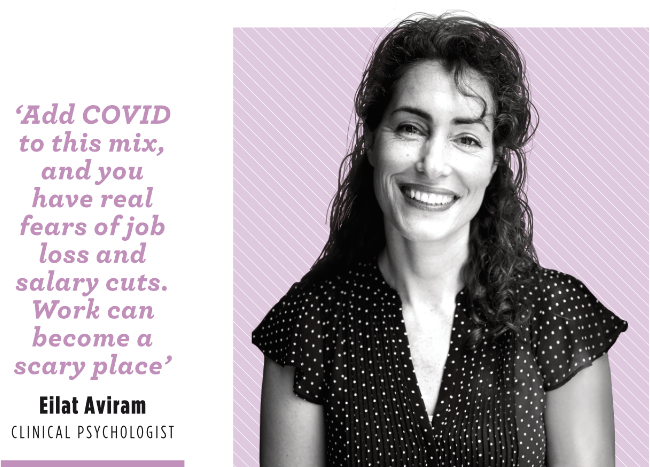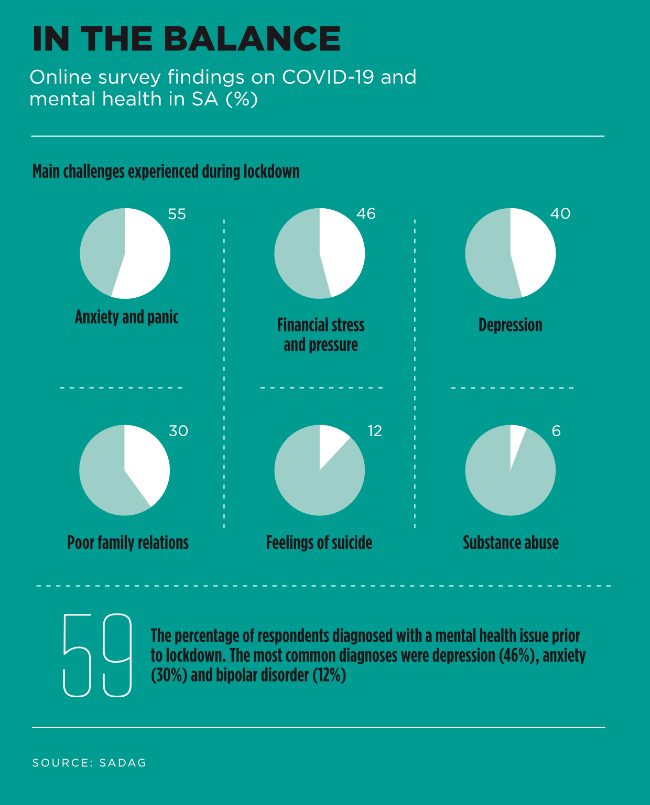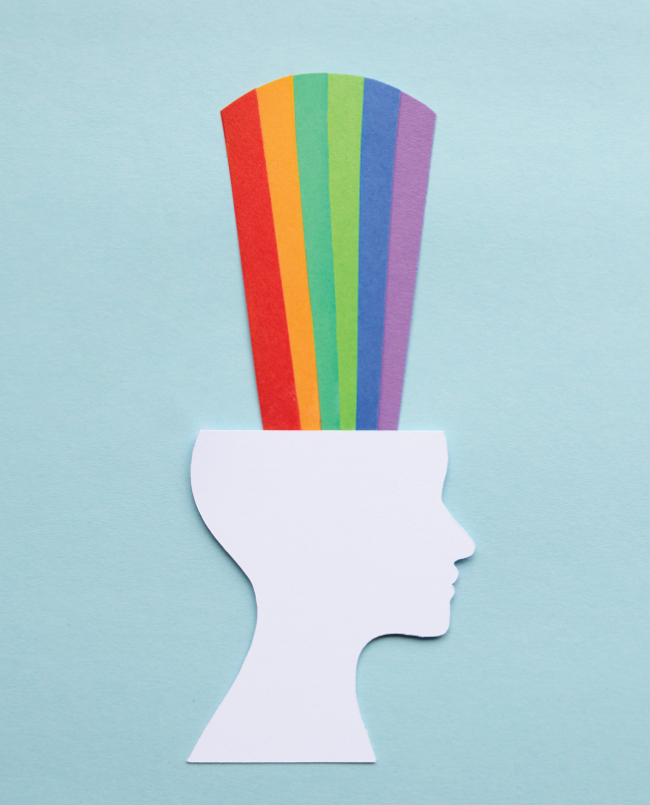Ask any of your peers how they feel at the end of a busy week, and it’s likely you’ll hear the words ‘exhausted’, ‘burnt out’, ‘stressed’, ‘anxious’… Can you relate? It may seem as if we’re pedalling furiously to keep up. Because if we don’t, we won’t just come last – we may just come off the bike altogether. And that’s before we even get to the office…
At work it can often feel as if we’re constantly hustling to stay on top, keep our jobs, strike that ever-elusive work-life balance. Add this to soaring rates of chronic stress, anxiety and depression in the world around us, and it spells disaster for our collective health and well-being. Bring the pandemic into the mix and it’s little wonder that experts say there’s a mental-health crisis looming that could last years.
The measures we’ve been taking to control the virus – isolation, lockdowns, business closures, restricted access – have created a perfect storm of anxiety, loneliness, grief and uncertainty. Forbes recently reported on a survey by Potential Project (a US-based company that helps organisations enhance performance, innovation and resilience in the workplace) that underpins this prediction.
Over the course of 20 webinars in the past few months, it took the ‘emotional pulse’ of around 5 000 employees and leaders from 1 000 global companies, including Cisco, Accenture and Microsoft. The team asked a simple yet critical question: ‘What are you feeling right now?’ Two emotions accounted for 50% of the total answers – worry and anxiety.
‘In general, negative emotions accounted for a whopping 81% of the responses and positive emotions only 19%. The root causes of that negativity? Isolation, loneliness, uncertain financial futures, and fear for their personal and loved ones’ well-being,’ the report states.
Zooming in closer to home, the South African Depression and Anxiety Group (SADAG) started receiving more calls after the start of lockdown from people feeling anxious, lonely, worried and depressed. Many callers are stressed about a combination of issues, including the spread of COVID-19, finances, relationship problems, job security, grief, gender-based violence and trauma.
‘COVID-19 and the lockdown has affected many South Africans, and it has had a serious impact on people living with a mental health issue often making their symptoms more heightened,’ says Cassey Chambers, SADAG operations director. ‘SADAG has been receiving calls from people with no history of anxiety or depression who are feeling overwhelmed, anxious and stressed.’
Take COVID-19 out of the picture though, and you’ll find a snapshot of workplace stress and anxiety that’s been building for years, reflecting a broader trend of increased stress in our modern society. Stress, depression, burnout and anxiety account for around 40% of all work-related illnesses in SA, according to SADAG. One in four workers has been diagnosed with depression and, as a result, takes an average of 18 days a year off from work.
Stress-related absenteeism is just half the story, though. Presenteeism is an even bigger problem, and the research found that only half the employees with depression actually do take time off work. The other half remain at their desks but aren’t ‘there’.
Depression, says psychiatrist and clinical psychologist Frans Korb, in an article on SADAG’s website, ‘negatively impacts productivity. If an employee has depression but is at work, they are five times less productive than an employee who was absent due to depression’. He adds that it affects cognitive functioning such as decision-making, concentration and memory, as well as problem-solving abilities.
What does this mean for us? Do we throw our hands up in despair and ‘vasbyt’ through it? A resounding no. But before we take heart in the fact that there is something companies can do about it – and many of them are – let’s take a closer look at what’s really getting to us at work.
‘There’s a strong culture of proving your worth by showing how hard you work,’ says Eilat Aviram, clinical psychologist, speaker and workshop facilitator. ‘Going home on time, taking time off, eating lunch or even going to the toilet are sometimes seen as signs that you are slacking off or don’t care about your career.’
Employer fears about profit margins – particularly in this climate – mean that employees can be pushed to produce more than is healthy for anyone. In Aviram’s view, the connection between having money or success and having worth makes this a very deeply stressful and personal issue for people and their work-life balance favours work – so life suffers.
‘Add COVID to this mix, and you have real fears of job loss and salary cuts,’ she says. ‘Work can become a scary place.’ In many cases, people are unhappy at work, adds Aviram. ‘There’s not much place for them to consider their physical, emotional and spiritual needs. They think that when they go to work, they have to put their needs and life aside and can only go back to “having their own life” after work again.’
This is a recipe for depression, anxiety, road rage, overeating, addiction, binge watching, shouting at your kids, bad relationships, affairs and more. If our needs are chronically unmet, we will start to seek out unhealthy avenues to feel satisfied instead.
Looking at the heightened situation of recent months, clinical psychologist and cognitive behavioural therapist Colinda Linde explains that the world has gone through a phase of grieving. ‘We’ve lost many aspects of what was taken for granted – health, travel, employment, financial security – to whatever extent was possible, given the economic situation globally,’ she says.

Feelings of anger, anxiety and sadness may become a clinical condition, such as depression. Physical symptoms are also common with all of the emotional states. We need to take our emotional temperatures, according to Linde. ‘Look out for symptoms in yourself or your colleagues, that are present daily for at least two weeks, especially if they are becoming more frequent or more intense.’
These may include problems falling or staying asleep; sleeping more than 10 hours per day and still feeling tired; loss of appetite; feeling overwhelmed, anxious or fearful; mood swings or over-reacting to small things; muscle tension or pain; high levels of frustration; and feeling angry, irritable or intolerant.
If you have at least two weeks of mood and sleep problems, along with any two of the other symptoms on this list, it may be time to speak to your GP or a mental health professional, says Linde.
Bear in mind that when you go to work, you are still a person with needs and feelings, says Aviram. ‘Look after yourself in the way you would look after your child or your pet in such circumstances. You’d never just skip feeding your dog or taking him to the toilet, would you? You wouldn’t just not water your plant. Look after your needs.’
Sometimes the best and quickest way to start meeting these needs when the outside doesn’t offer this is to say kind and encouraging things to yourself. Acknowledge your own efforts and care about you. ‘Many of us are very critical to ourselves in our own heads,’ she says. ‘It makes a huge difference if you speak to yourself kindly instead and make the effort to meet your needs.’
Linde agrees. During times of stress – whether it’s the ‘usual’ dose or heightened by COVID – it’s important to get the basics right, health-wise. These are simple yet crucial to maintaining well-being. Exercise regularly (ideally 20 minutes of aerobic exercise daily, and possibly also stretches); avoid alcohol and other drugs (they provide only short term relief, then make things worse); and stay connected with family or friends. And if you have a pre-existing medical condition that may be aggravated by stress (diabetes, asthma, hypertension), talk to your GP to check how your physical health is doing and whether you need more support.
When it comes to employers, there’s an enormous amount they can do to help employees navigate stress and anxiety – both at work and the wider world.
Corporate wellness programmes have come a long way in the past two decades. They’re pretty much part of the workplace fabric now. And, for many companies, gone are the days when an organisation’s commitment to the health and wellness of its employees consisted of providing health insurance, a dis counted gym membership and the occasional wellness day.
With stress and burnout at unprecedented levels, corporate wellness has now become an $8 billion-a-year industry in the US, according to the Harvard Business Review in a late-2019 article. In the US, one in five adults suffers from mental health challenges each year, costing companies 200 million lost workdays, along with $200 billion.
The evidence is more anecdotal in SA, but it’s a fair reflection of the reality on the ground. To this end, corporate wellness schemes have become the norm. But they form part of a broader, more inclusive and holistic approach to combating stress and promoting well-being in the workplace.

There is so much companies can do, and are doing. And where they are not, Linde, as a former chairperson of SADAG, references the organisation’s advice to companies.
‘Educate your employees about depression, especially how cognitive symptoms can affect their work performance. Show them they are not alone and that you care about their well-being,’ she says. Raise awareness about employee-assistance programmes, and emphasise how they can help with mental-health problems, such as depression. As an employee, make it your business to find out about these and engage with them.
‘Promoting a culture of acceptance around depression and other psychiatric disorders is vital too,’ she adds. ‘These are no different to chronic conditions, such as diabetes and asthma, and should be addressed openly and honestly.’
If employees have opened up about struggling with depression, refer them to a mental-health professional and reassure them that the illness can be treated. Linde advises companies to explore creative ways to support an employee’s recovery, such as flexible/adjusted working hours or allowing them to work from home temporarily, if they’re not currently doing so in the ‘new normal’.
Of course, we as individuals have a proactive role to play, too. When it comes to the post-COVID era, Linde emphasises the importance of actively seeking out support. ‘This will not only be good for your mental health but good for your business too.
‘Social support has been studied in the area of coping with dread diseases, and it is also an important buffer during times of upheaval and economic instability.’
We know that there are ways to manage stress and achieve a degree of work-life balance, whatever type of job, role, industry or organisation we work in. Most companies have offerings in place that aim for optimal workplace wellness, but it’s up to us engage with them fully. Very simply, work-life balance – or integration, as many like to call it – begins with us, our attitudes and our choices. Within your own unique context, it’s about making the right choices, however challenging this may be at times.
You can’t always convince your employer to change company policies that don’t work for you, but you can take responsibility for your own needs and create a balance that does work for you. And in this new world of ours, it’s more important than ever before.









